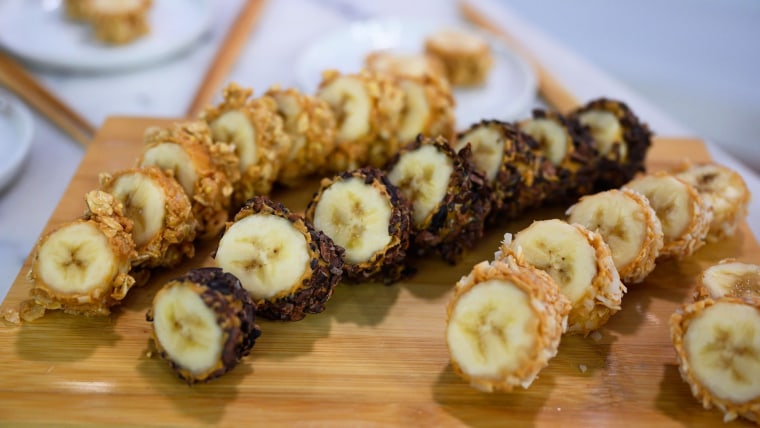Bananas are one of the most popular fresh fruits in the world. Not only are they naturally sweet and affordable, they are also packed with nutrients. Bananas have a bad reputation for their high sugar and starch content, but this delicious tropical fruit is packed with potassium, vitamin B6, fiber and prebiotics. Not to mention, bananas can replace sugar in many baked goods.
banana nutritional content
1 medium banana contains:
- 105 calories
- 1 gram of protein
- 0 grams of fat
- 27 grams of carbs
- 3 Grams of Fiber (12% of the Daily Value (DV))
- 422 milligrams of potassium (16% of daily value)
- 10 mg Vitamin C (13% DV)
- 0.4 milligrams of vitamin B6 (31% DV)
Health Benefits of Eating Bananas
“Bananas are packed with essential nutrients like vitamin B6, vitamin C, magnesium and fiber,” says Lauren Harris-Pincus, R.D.N. and author of The Everything Easy Pre-Diabetes Cookbook. . “They’re also a missing nutrient in the American diet and one of the best sources of potassium, which is important for regulating blood pressure and supporting nervous system function.
Unfortunately, most Americans don’t eat enough potassium each day (3400 mg for men and 2600 mg for women). That’s why the 2015-2020 Dietary Guidelines for Americans lists potassium as a nutrient of concern. Studies conclude that a potassium-rich diet is associated with lower blood pressure levels, cardiovascular disease risk, and stroke. Additionally, a study looking at the effects of certain fruits on blood pressure found an inverse relationship between bananas and diastolic blood pressure. In other words, the more bananas you eat, the lower your risk of high blood pressure.
Potassium also plays an important role in regulating water in the body and is an important electrolyte that is lost through sweat. It is recommended that you eat foods like bananas to restore the deficiency.
Bananas contain dietary fiber, which is beneficial for digestive health. It also contains prebiotics, plant fibers that promote the growth of probiotics in the gut. Prebiotics are associated with improved digestive health, immune system function, cardiovascular health and cognition. A randomized controlled trial found that eating two bananas a day may promote the growth of probiotics in the gut.
Finally, bananas are a great source of vitamin B6, which has many functions in the body. Vitamin B6 he requires over 100 enzymatic reactions and is an important part of protein metabolism. That said, most Americans get plenty of vitamin B6 from their diet, so there’s no need to look for it.
Are there any downsides to eating bananas?
Bananas contain a sugar alcohol called sorbitol, which can cause gas and diarrhea in some people.In general, sorbitol is tolerated in small amounts, so many people eat bananas without problems. Ripe bananas are also high in FODMAPs and carbs can cause gas and bloating. Some people can eat bananas with no complaints, while others find it difficult to stomach.
3 Facts About Bananas
Bananas are much better than what the Nutrition Facts list shows. Here are some lesser-known facts about the bright yellow fruit.
Bananas are a source of resistant starch
“Banana is a source of resistant starch, especially if it’s on the green side,” says Harris-Pincus. As the name suggests, resistant starch “resists” digestion and slows absorption in the large intestine. There, it is fermented by the microbiome to produce molecules called short-chain fatty acids. This has been associated with a reduction in colon cancer and improved insulin sensitivity.”Therefore, unripe bananas (due to resistant starch) may have a slower glycemic response than overripe bananas.” There is,” said Harris Pincus.
Bananas should be eaten before exercise
Bananas are rich in carbohydrates and are the main source of energy for exercise. One study compared a banana to his 6% carbohydrate sports drink to assess the effects of both on cycling performance. The study found that both give similar performance results. Additionally, one study suggests that banana properties, primarily fructose and phenolic (plant) compounds, may improve overall exercise performance.
Bananas contain tryptophan
You probably know the word “tryptophan” as the nasty stuff that makes you sleepy in turkey. Just a myth. Believe it or not, tryptophan is the only precursor to the mood-stabilizing chemical serotonin. Therefore, eating foods containing tryptophan may have a positive effect on your mood.
Healthy Banana Recipes and Ideas
“I love using bananas to sweeten my food without adding too much sugar,” says Harris-Pinkus. Not surprisingly, most recipes that use bananas have a distinctly sweet taste. Here are some simple uses for bananas:
breakfast: Banana is the star of the Chia Pudding show. Or blend bananas nicely for a hearty baked her oatmeal that tastes like cake. Or let her start the day with her Coffee Smoothie, Chocolate Banana with Turmeric.
snack: “One of my favorite recipes is one of the simplest PB banana ‘sushi’. Spread your favorite nut butter (or sunflower if you don’t have nuts) on a high fiber tortilla, add the banana and roll it up. Then cut it into pieces like sushi rolls,” says Harris-Pincus. Or, up your toasting game with this Sweet Potato, Peanut Butter and Banana Toast recipe from Joy Bauer. Enjoy an afternoon break with a banana indulgence with Classic Banana Bread or Dylan Dryer Chocolate Chip Oatmeal Banana Balls.
dessert: “Blending frozen bananas to make ‘nice cream’ is a great one-ingredient dessert,” says Harris-Pincus. But you can’t go wrong with banana donuts, banana fosters, or banana pudding in maple glaze recipes.
Related:

